Title: "Revelations"
(click image to view larger)
I'm currently reading a book about Vitamin D, which among other things reveals that many people in North America have insufficient levels of Vitamin D, or are virtually completely deficient. There are numerous consequences to this, but one of the most striking is that these deficiencies may account for 30% of deaths from internal cancers. One of the reasons the author (Dr. Michael Holick) suspects for the plummeting levels of Vitamin D in most people is the very successful lobby by the dermatology community that any unprotected sun exposure is dangerous. Vitamin D is produced naturally in the skin by the UVB rays of the sun, and people who live closest to the equator have lower incidences of many internal cancers compared to those in more northern locations. Holick and many other researchers have calculated that many hundreds of thousands of cancer deaths per year might be prevented by ensuring sufficient vitamin D levels in people, while the increase in deaths from nonmelanoma skin cancer from getting the small amount of direct sun exposure to ensure good vitamin D levels would be no more than 3,000 per year.
I mention this mainly because it's a perfect example of how reductionist approaches to medical science can solve one problem but inadvertently can potentially cause a much bigger problem. And I think that a reductionist approach to photography can also be counter-productive. The most successful images do not simply emphasize form, or line, or tone - they incorporate all of these in ways that are true to the subject of the photograph. Minor White and Ruth Bernhard were famous for urging students to consider what it truly meant to be the subject - be it tree, rock - to truly connect to the history of the subject. It seems like hocus-pocus, but that deeper connection shows in the resulting work and is intuitively recognized by the viewer of the work. Focusing on one small thing, like reducing a problem in science to one element, loses the impact of what's outside that narrow focus.


1 comment:
A beautiful photo - it feels celebratory, infused with the joy of discovery, of being able to (metaphorically) see things in a new way.
I agree that reductionist approaches aren't helpful in photography - it seems to me that not only do such approaches miss the "big picture" (as it were) in their narrow focus, but also, they seem likely to bypass the quality of play that is so important in creativity. Some degree of hocus-pocus might be OK in this context :-)
Post a Comment